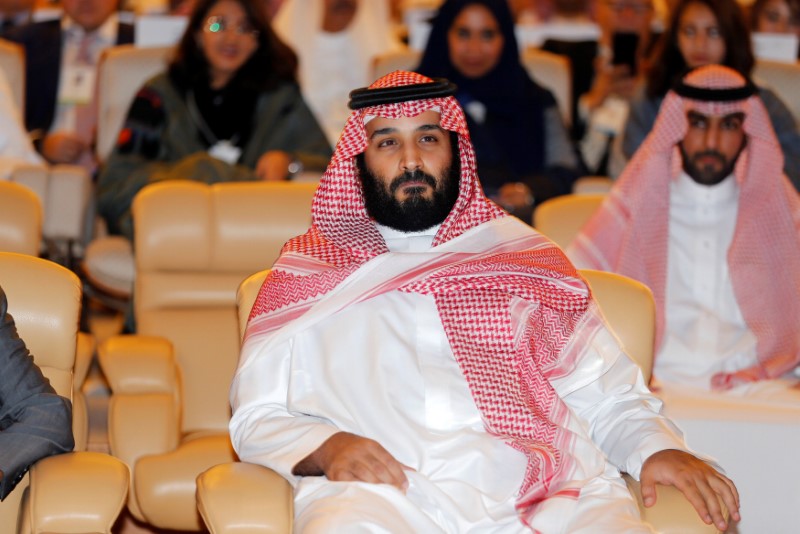(Bloomberg Opinion) -- Since the controversy surrounding the murder of critic Jamal Khashoggi, Saudi Arabia has been able to count on the support of most Arab states. Even as officials privately expressed the hope that the international condemnation of the Washington Post columnist’s killing would curb the powers of Crown Prince Mohammed bin Salman, the kingdom’s de-facto ruler, their public statements have been unequivocal.
Now, with prince politically weakened by the controversy, some of the region’s most powerful leaders — Israel’s Prime Minister Benjamin Netanyahu and Egypt’s President Abdel-Fattah El-Sisi — are quietly lobbying the Trump administration to support him. Their argument: The survival of MBS, as the crown prince is widely known, is essential to the kingdom’s stability, and to the containment of Iran, the main American and Israeli goal in the region.
There are reasons for the U.S. and others to support MBS, especially if he opens up the Khashoggi investigation, embarks on reform, and stops the war in Yemen. But stability is not one of them. It’s an old, thoroughly discredited trope deployed in the support of Middle Eastern tyrants for decades. It has rarely been used to defend a Saudi ruler, and for good reason.
Stability is, in fact, the House of Saud’s strongest suit. The family has ruled modern Saudi Arabia since 1932, with mostly smooth transfers of power from one ruler to another. It has survived all manner of political earthquakes, from coup attempts to the challenge of political Islam. It overcame the destabilizing effect of the 1979 Iranian Revolution and the attack on the Grand Mosque in Mecca the same year. Its relationship with the U.S. has also endured great stresses, like the oil shocks of the 1970s and, more recently, the 9/11 attacks on New York and Washington.
There is, in short, no country in the Middle East where a change of ruler is less likely to create instability, or threaten the alliance with the United States.
That Sisi should make the stability argument is no surprise: It is frequently deployed by his apologists, in Cairo and Washington alike, to justify continued U.S. support for the Egyptian autocrat. Sisi might also feel he owes the Saudi royals for backing the 2013 coup that brought him to power. Under the general, Egypt has become increasingly economically dependent on Saudi Arabia, and Sisi has steadfastly backed MBS’s adventurism in the region, including the war in Yemen and the blockade of Qatar. To the chagrin of many Egyptians, Sisi has even ceded territory to the Saudis.
Netanyahu’s backing of MBS is more surprising. It is true that Israeli-Saudi relations have improved greatly since Prince Mohammed took over, mainly because both countries feel threatened by Iran’s aggressive, widening influence in the region. But for that very reason, Israel’s goals are not dependent on the crown prince: The fear of Iran is institutional, not individual. It long predates MBS’s rise, and will long outlast him. It is inconceivable that any Saudi monarch would adopt a significantly different posture toward the Islamic Republic.
There’s another reason Israel doesn’t need MBS: Netanyahu’s own astute cultivation of regional relationships that were once thought impossible. Last month, he broke new ground by traveling to Muscat for an audience with Oman’s Sultan Qaboos. The same week, his culture minister was in Dubai for a visit that included a tour of the grand mosque. Netanyahu also met Sisi in September when both attended the United Nations General Assembly. These relationships, forged independently of MBS, do not depend on American support for the crown prince.
Indeed, any rational examination of MBS’s policies might lead both Israel and the Trump administration to conclude that, far from being crucial to the containment of Iran, Prince Mohammed has undermined that effort. The war in Yemen and the blockade of Qatar, both his initiatives, have divided the Arab world, draining military and political resources, just when unity against the Iranian threat is most important. And the Khashoggi murder, as U.S. Defense Secretary Jim Mattis pointed out in Manama last month, has undermined regional stability.
In deciding whether to support MBS, the Trump administration should listen more to its defense secretary and less to the leaders of Israel and Egypt. Neither the stability of Saudi Arabia nor the drive to contain Iran depend on the crown prince.
